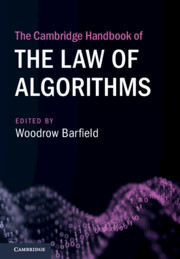Book contents
- The Cambridge Handbook of the Law of Algorithms
- The Cambridge Handbook of the Law of Algorithms
- Copyright page
- Contents
- Figures
- Tables
- Notes on Contributors
- Foreword
- Preface
- Acknowledgements
- Abbreviations
- Part I Introduction and Setting the Stage for a Law of Algorithms
- 1 An Introduction to Law and Algorithms
- 2 The Opinion of Machines
- 3 Private Accountability in an Age of Artificial Intelligence
- 4 Algorithmic Legitimacy
- 5 Understanding Transparency in Algorithmic Accountability
- Part II Business, Regulations, and Decision-Making with Algorithms
- Part III Intellectual Property and Algorithms
- Part IV Criminal Law, Tort Issues, and Algorithms
- Part V Constitutional Law, Human Rights, and Algorithms
- Part VI Applications and Future Directions of Law and Algorithms
- Index
3 - Private Accountability in an Age of Artificial Intelligence
from Part I - Introduction and Setting the Stage for a Law of Algorithms
Published online by Cambridge University Press: 19 October 2020
- The Cambridge Handbook of the Law of Algorithms
- The Cambridge Handbook of the Law of Algorithms
- Copyright page
- Contents
- Figures
- Tables
- Notes on Contributors
- Foreword
- Preface
- Acknowledgements
- Abbreviations
- Part I Introduction and Setting the Stage for a Law of Algorithms
- 1 An Introduction to Law and Algorithms
- 2 The Opinion of Machines
- 3 Private Accountability in an Age of Artificial Intelligence
- 4 Algorithmic Legitimacy
- 5 Understanding Transparency in Algorithmic Accountability
- Part II Business, Regulations, and Decision-Making with Algorithms
- Part III Intellectual Property and Algorithms
- Part IV Criminal Law, Tort Issues, and Algorithms
- Part V Constitutional Law, Human Rights, and Algorithms
- Part VI Applications and Future Directions of Law and Algorithms
- Index
Summary
Algorithms in society are both innocuous and ubiquitous. They seamlessly permeate both our on- and offline lives, quietly distilling the volumes of data each of us now creates. Today, algorithms determine the optimal way to produce and ship goods, the prices we pay for those goods, the money we can borrow, the people who teach our children, and the books and articles we read – reducing each activity to an actuarial risk or score. “If every algorithm suddenly stopped working,” Pedro Domingos hypothesized, “it would be the end of the world as we know it.”1
Information
- Type
- Chapter
- Information
- The Cambridge Handbook of the Law of Algorithms , pp. 47 - 106Publisher: Cambridge University PressPrint publication year: 2020
